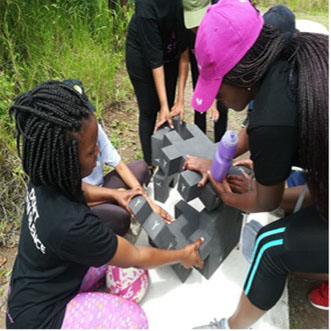| Home | Community Engagement | Research | Co-ordinators | Staff | News |
Child and Youth Care
 CYC students working with children/ young people |
 CYC students engage in team exercises |
Description of programme
Child and youth care work involves working with children and young people as whole people in order to promote their social competence and healthy development. This is done by taking part in and making use of their everyday environments and life experiences and by building therapeutic relationships, especially with the child or young person who is the focus of attention. (Simple version of quote in the online CYC PDF)
Why pursue a profession in Child and Youth Care?
The four-year professional Bachelor of Child and Youth Care degree aims to provide students with skills, knowledge and experience of working in a variety of child and youth care settings. The major focus is the development and healing of the child within family, community and other settings. The study, practice and application of knowledge are strengthened through practical training and community projects. These involve the student in the child and youth care worker’s duties related to holistic care, behaviour management, and developmental assessment and programming to optimize the health and well-being of young people and families. The child and youth care worker does not undertake therapy in the traditional sense; rather, she/he has the job of purposefully creating and using a developmental and therapeutic milieu, building a therapeutic relationship with the child, and promoting healing and development through the conscious use of events as they occur in the life-space. The child and youth care worker is not a psychologist, social worker or a teacher, but should be able to work with these professionals on an equal footing within the multidisciplinary team.
Programmes in Child and Youth Care
The programme consists of a 4-year Bachelors of Child and Youth Care degree, post-graduate diploma in Child and Youth Care and Master of Child and Youth Care.
Careers in Child and Youth Care
At present, the areas in which learners and graduates work include the following:
- Residential child and youth care/treatment centres (e.g., children’s homes, substance abuse programmes)
- State facilities (e.g., places of safety, secure care, special schools)
- Probation programmes
- Street shelters and outreach programmes
- Educare centres
- Community development programmes
- Assistant probation officers in law courts
- Day care and play care centres
- Hospitals caring for abandoned children
- Mediators and facilitators in “at risk” communities
- Hostels at residential/educational facilities
- Diversion programmes
- Wilderness training and adventure programmes
- Schools and after school care programmes
- Youth development programmes
- Intermediaries in court settings
Staff


